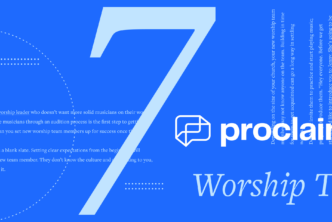Our “More Than a Song” series is about exploring the value of expressions of worship that move beyond music. Music is a powerful means for praising God, but sometimes we let worship music become our definition of worship, rather than a single component of it. The definition of worship is broader, and the ways we express it should be too.
Spoken-word poetry is a powerful way to blend the hard-hitting truths found in sermons with the contagious adoration found in worship music. It’s a way to share complex collisions of theology and life through rhythm, rhyme, and the art of poetic devices.
Even if you’ve seen it before, take a look at Jefferson Bethke’s “Why I Hate Religion, but Love Jesus,” and consider the way rhythm and the arrangement of the words contribute to the power and beauty of the message:
A significant strength of spoken word is the performance aspect. But in terms of actual application within your church, it can also be one of the greatest challenges to work around.
If you’ve ever thought it would be nice to use spoken word to point your congregation to God, here are four things to think about:
1. Spoken word is an art that takes time to learn, like worship music
Arranging theologically sound, rhythmic sentences takes an intimate understanding of words—how they sound, what they mean, the ways they connect, and the feelings they stir when read aloud. You don’t have to have an English degree to recognize if something sounds good or bad—just like you don’t have to have a music degree to know when someone needs more practice on the guitar.
But it does help. Without knowing what you’re listening for, it’s hard to make judgment calls without feeling like your feedback is subjective or personal.
Whatever your church size, you likely have people in your church right now who connect with God through writing. If you find people in your church who are passionate about poetry and creative writing, and someone capable of leading the group, this group can become a valuable creative pool for your church to draw from and feed into.
Sometimes the words are just for God—intimate worship no one else participates in. But sometimes God moves people so much through their writing that they can’t contain the words, and others latch onto their beautiful, verbal depictions of God’s love.
Establishing a group within your church is an easy way to affirm, build up, and share the words people are led to put on paper. If the words honor, adore, and uplift Jesus, and you’ve created a group that can effectively decide when something is ready and when someone needs more practice, you can consider setting aside time for the group to occasionally share with the congregation in an appropriate context—whether that be your Sunday service, a youth group, or another church gathering.
2. The story in the speaker can be as meaningful as the story in the words
I once had the pleasure of working on some spoken word poetry with a friend who barely passed high school, but years later discovered his passion for spoken word. It was a struggle sometimes to work through his poetry. I wanted to help him present his message in a way that was both authentic and aesthetically pleasing, and that meant toning down the technical and relying on critical analysis to get at the heart of his poem.
The power of the resulting spoken-word piece came as much from the fact that he was sharing it as from the words he shared. The teachers and mentors that helped shape him were faced with a tangible testimony of the transformational capability of Christ, audibly heard in the words he spoke, and visually represented by his own transformation from troubled teen to passionate witness. They were moved to tears because in a small way, they were a part of the story, and the public proclamation represented the unveiling of a deeply personal spiritual message, just for them: God heard their prayers, their work meant something, and the “lost sheep” were worth pursuing.
3. It’s not about anyone’s ego
While the story behind the individual performing spoken word can be a factor behind its impact, worshiping God with words should never be about people—it’s what God does with and through those people.
For example, which is a better indication of how great a worship set was: “That solo you had was amazing! You totally nailed that song,” or “I really connected with God during worship this morning”?
Your church’s worship team isn’t trying to put on a cool concert. It’s facilitating an intimate, vocal adoration of God. Any element you add to your worship service should serve the same purpose.
If someone wants to share a spoken-word poem with your congregation and you’re concerned that it’s more about them than about God, it’s probably not fit for sharing with your church. But you shouldn’t let the fact that someone wants to share something be the only indicator of whether or not they are seeking personal attention.
4. You can participate without performing
One of the biggest obstacles to experiencing spoken-word poems (besides investing the time to make sure they are worth sharing), is figuring out how to keep a spoken-word performance from being a one-person show.
It’s not the same as a sermon, where the pastor teaches the congregation out of the fruits of careful study and prayer, and it’s not the same as when the worship band invites the congregation to participate in corporate worship. In a sense, it has qualities of both. Worship songs are familiar and designed to allow the congregation to join in. On the other hand, with spoken word, it would be pretty distracting if the person next to you (somehow) knew the words and rhythm well enough to follow along, and it might cause you to miss words that you would have otherwise identified with. While the arrangement of the words is a component of spoken word, the general idea is that the audience participates through listening, processing, and identifying with the words that are spoken. It’s a mix of the feelings when you first hear a new worship song, just to listen to it and experience the feelings the words instill, and the bold fill-in-the-blanks of a sermon, where the words sit with you and resonate.
Words by themselves have no meaning. Creating meaning is an interactive process between the listener and the speaker. That’s how we connect our lives to Scripture. It’s also how we participate in adoration of God through spoken-word poems.
What are your thoughts about spoken word as a viable expression of worship? Has your church ever experienced it together? Tell us in the comments!
* * *
Every week, your church shares the most important story ever told. Your message is what matters most. Let Proclaim Church Presentation Software take care of the details.




